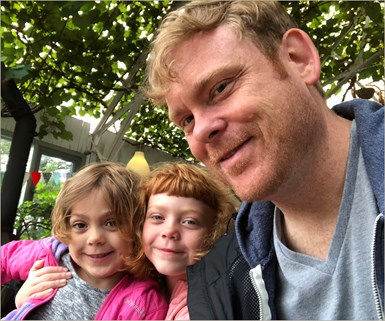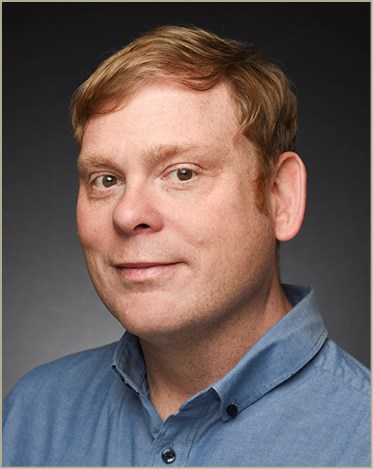The Not-So-Simple Act of Storytelling
The industries Gardner Business Media reports on grow and evolve constantly. New technologies emerge and change things and become part of the larger story almost constantly. Scott Francis, Editor-In-Chief, Products Finishing discusses the importance of asking questions, listening to the real experts who have devoted their lives to their work, and the role of storytelling in manufacturing.
Employee Spotlight Profile
Scott Francis, Editor-In-Chief
Products Finishing

Products Finishing Editor-In-Chief Scott Francis says that end of the day his job is to tell stories, helping to spread the word about the finishing industry and its people.
One of the most gratifying things is telling my kids an improvised bedtime story. When it’s a good story, you can see their imagination take flight. The story begins to take on a life of its own, growing, evolving and sparking new ideas. The kids usually start making up their own stories at this point, and it makes for a long night.
When I think about the core of Gardner Business Media and what we really provide for the audiences we serve and the shops, suppliers and associations that we partner with, I can’t help but think back to this simple act of storytelling. As a media company Gardner has collected an amazing amount of information about the industries we serve, and has worked hard to establish itself as an authoritative resource for suppliers, manufacturers and OEMS – but at the end of the day those folks are the true experts and our ultimate job is to tell their story.
Prior to assuming the role of editor-in-chief of Products Finishing, I worked as a senior editor for CompositesWorld. The composites industry is a complicated one where the materials used for any given product are often actually created at the same time as the product’s fabrication. Fibers are combined in myriad ways within a matrix of any number of polymers. Everything about composites is varied and a sum of parts. There is no way I could pretend to be an expert on any of the stories that I researched and told. The key to reporting on any such story is asking lots of questions. The trouble is that the answers to those questions usually lead to more questions. Then, those answers lead to even more questions. And, so it goes.
The industries we report on grow and evolve. New technologies emerge and change things and become part of the larger story almost constantly. If you’re paying attention, there are always new questions to ask – new threads to pull. In fact, you can spend so much time researching and revising an article that it can be difficult to know when it’s really done. At the end of the day, you have to pull things together into a cohesive narrative. Remembering that my job is to tell a good story has always been a cornerstone for me – a place to return to when I need clarity on how to finish a piece.
Through the course of my career as a writer and editor I’ve written for publications that covered a variety of subjects from woodworking to graphic design. I would never call myself an expert on any of them. There are people who have spent much more time focused on their chosen skill or craft who are much more fitting of such a title. However, the common thread that I’ve noticed throughout my career in writing and editing is the need for clear, efficient and effective communication, regardless of what industry you’re working in.
So, my job is to help people tell their stories. Every industry is filled with experts who’ve spent their lives honing skills and learning and developing ways of making things. None of them need a writer (or even an editor-in-chief) to tell them how to do what they do. But, perhaps what might be useful is someone who can listen to their stories and maybe help spread the word, clarify the message or explain a complicated concept.
That’s what makes Gardner Business Media and all of the brands it encompasses good at what we do. We put the focus where it rightly should be – on the industries and the people working in them. It’s your story – let’s make it a good one, shall we?
Fun fact: In addition to being a writer, Scott is black belt martial artist and senior instructor at Cincinnati Taekwondo Center.
Need more information?
Scott Francis, Editor-In-Chief
Products Finishing
513-652-9706
About the Author
Scott Francis
Scott is the editor of Products Finishing and served previously as writing editor for CompositesWorld. He has also edited for Writer's Digest, HOW, Popular Woodworking and has authored books on a range of topics. He is the author of Monster Spotter's Guide to North America (HOW Books 2007) and co-author of The Unofficial Hobbit Handbook (Writer's Digest, 2012) and OMG! I Forgot the Card (HOW Books, 2014). Scott has a bachelor’s degree in writing and editing and a minor in biology from Western Carolina University.
RELATED CONTENT
-
Life On Deadline
EVP of Content and Web Kate Hand on building an unexpected career at a place that values balance.
-
4 Ways to Use Power Words to Supercharge Your Message
To supercharge your message, add power words. Power words enable you to capture attention, engage emotions, create curiosity, and seduce the senses of your audience. Just as magicians use magic words like abracadabra, marketers and communicators use power words to supercharge their messages.
-
Embracing Career Change
After 16.3 years, Derek Korn had become Modern Machine Shop’s Executive Editor, Technical Director of the brand’s Top Shops benchmarking program and creator of the annual Editors’ Walking Club. His plan was to continue with the magazine until retirement. But the editor-in-chief of sister publication Production Machining announced that he was retiring. The company asked if Derek would be open to moving to Production Machining. For him, it was a matter of choosing comfort with a brand he was familiar with or changing to lead a new one. He not only chose to change, but to embrace it.


